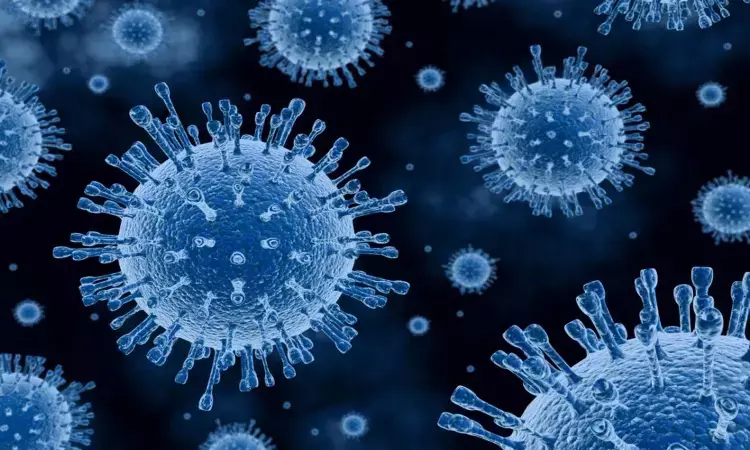- Home
- Medical news & Guidelines
- Anesthesiology
- Cardiology and CTVS
- Critical Care
- Dentistry
- Dermatology
- Diabetes and Endocrinology
- ENT
- Gastroenterology
- Medicine
- Nephrology
- Neurology
- Obstretics-Gynaecology
- Oncology
- Ophthalmology
- Orthopaedics
- Pediatrics-Neonatology
- Psychiatry
- Pulmonology
- Radiology
- Surgery
- Urology
- Laboratory Medicine
- Diet
- Nursing
- Paramedical
- Physiotherapy
- Health news
- Fact Check
- Bone Health Fact Check
- Brain Health Fact Check
- Cancer Related Fact Check
- Child Care Fact Check
- Dental and oral health fact check
- Diabetes and metabolic health fact check
- Diet and Nutrition Fact Check
- Eye and ENT Care Fact Check
- Fitness fact check
- Gut health fact check
- Heart health fact check
- Kidney health fact check
- Medical education fact check
- Men's health fact check
- Respiratory fact check
- Skin and hair care fact check
- Vaccine and Immunization fact check
- Women's health fact check
- AYUSH
- State News
- Andaman and Nicobar Islands
- Andhra Pradesh
- Arunachal Pradesh
- Assam
- Bihar
- Chandigarh
- Chattisgarh
- Dadra and Nagar Haveli
- Daman and Diu
- Delhi
- Goa
- Gujarat
- Haryana
- Himachal Pradesh
- Jammu & Kashmir
- Jharkhand
- Karnataka
- Kerala
- Ladakh
- Lakshadweep
- Madhya Pradesh
- Maharashtra
- Manipur
- Meghalaya
- Mizoram
- Nagaland
- Odisha
- Puducherry
- Punjab
- Rajasthan
- Sikkim
- Tamil Nadu
- Telangana
- Tripura
- Uttar Pradesh
- Uttrakhand
- West Bengal
- Medical Education
- Industry
NICE releases 4 new rapid COVID-19 guidelines

NICE has released 4 new rapid medicine search of the specialistguidelines on the active management of patients with suspected and confirmed COVID-19, and in patients without COVID-19. The guidelines have been designed to maximise the safety of patients whilst enabling services to make the best use of NHS resources.
COVID-19 rapid guideline: severe asthma
The guideline on severe asthma says that people should continue to take their treatment as prescribed and only attend essential appointments alone, if possible, to minimize the risk of infection.
The guideline recommends that patients should be advised to regularly clean equipment such as face masks and mouth pieces, and that they should not share their inhalers and devices with anyone else.
COVID-19 rapid guideline: managing suspected or confirmed pneumonia in adults in the community
As COVID-19 becomes more prevalent in the community, pneumonia is more likely to be caused by the COVID-19 virus than bacteria. Viral pneumonia will not respond to the use of antibiotics therefore they should only be offered if bacteria are the likely cause, it is unclear whether the cause is bacterial or viral and symptoms are more concerning or the person is at high risk of developing complications.
People should seek medical help without delay if their symptoms don't improve or worsen rapidly, whether they have been given an antibiotic or not.
When possible, clinicians should discuss the risks, benefits and possible likely outcomes of treatment options with patients with COVID-19, and their families and carers, so that they can express their preferences about their treatment.
COVID-19 rapid guideline: rheumatological autoimmune, inflammatory and metabolic bone disorders:
The guideline on rheumatological autoimmune, inflammatory and metabolic bone disorders says that patients with COVID-19 should not suddenly stop taking their medication but should seek advice on which medicines to continue and which to temporarily stop.
If they feel unwell, patients should contact their rheumatology team about any rheumatological medicines issues or if their condition worsens contact NHS 111 for advice on COVID-19. Healthcare professionals should use NHS England's COVID-19 clinical guide when deciding what treatments are appropriate.
COVID-19 rapid guideline: managing symptoms (including at the end of life) in the community
The guideline on managing symptoms provides advice to health professionals on the management of cough, fever, breathlessness and anxiety, delirium and agitation in those with COVID-19. It includes approaches for managing these symptoms such as considering the use of paracetamol in people with fever.
People are advised to first treat a mild cough with simple measures and should also avoid lying on their back as this can make coughing, which helps clear the lungs, more difficult. If the cough is more severe and distressing, codeine linctus, codeine phosphate tablets or morphine sulfate oral solution could be considered for short-term use.
Further guidelines will be announced in due course but are likely to include: COPD; Cystic fibrosis and dermatological conditions in people receiving immunotherapy. NICE will publish new guidelines each based on the priorities for patients and the NHS.
NICE will also make the guidelines internationally available so that health systems around the world can see the approach the UK is taking.
Dr Kamal Kant Kohli-MBBS, DTCD- a chest specialist with more than 30 years of practice and a flair for writing clinical articles, Dr Kamal Kant Kohli joined Medical Dialogues as a Chief Editor of Medical News. Besides writing articles, as an editor, he proofreads and verifies all the medical content published on Medical Dialogues including those coming from journals, studies,medical conferences,guidelines etc. Email: drkohli@medicaldialogues.in. Contact no. 011-43720751


